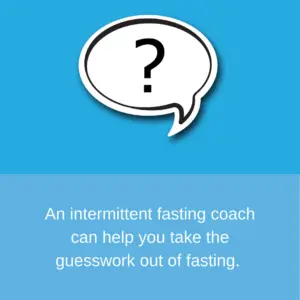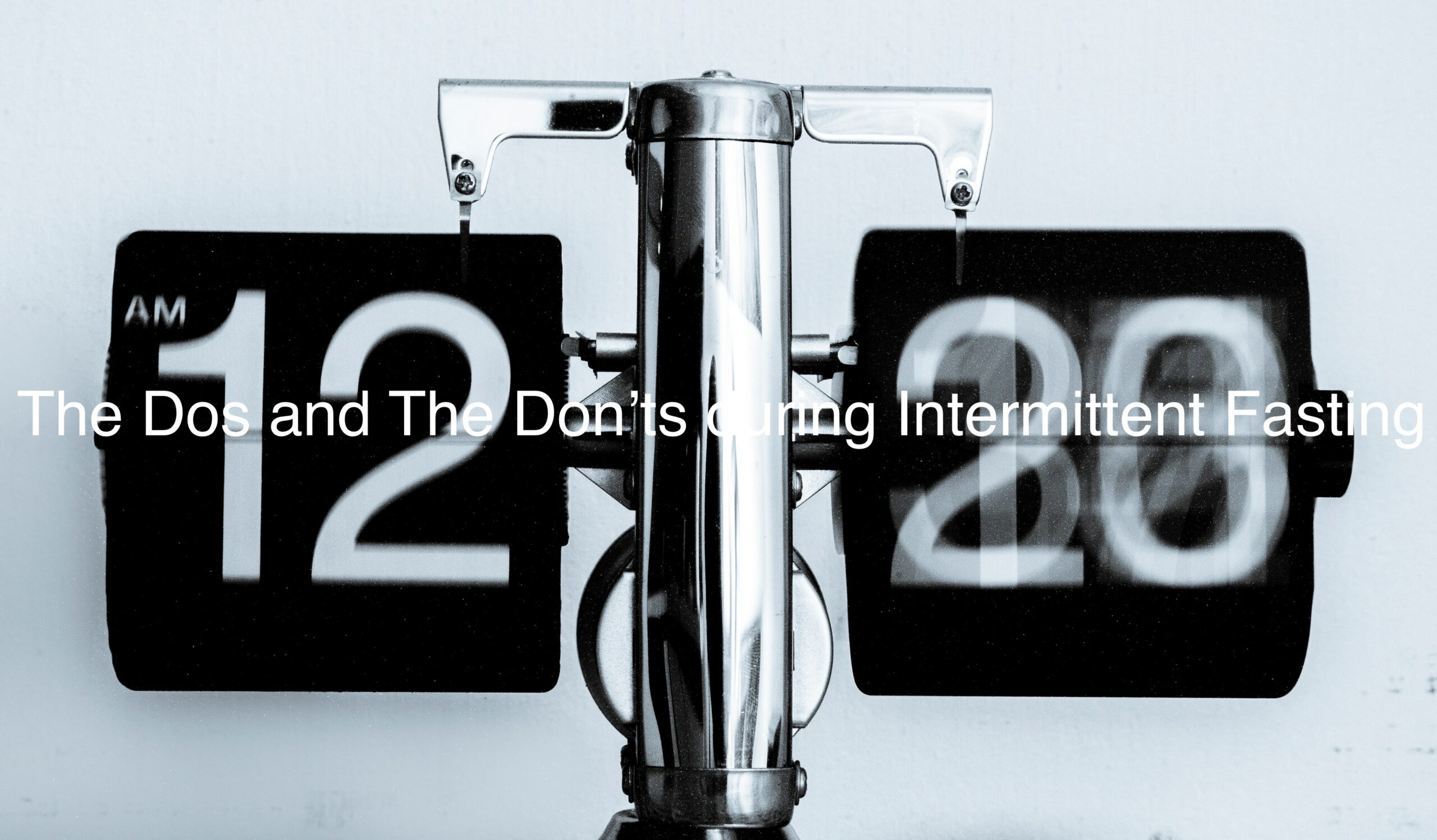Read all about the Dos and Don’ts During Intermittent Fasting!
Are you starting an intermittent fasting journey? To make the most out of your efforts, it’s crucial to understand the dos and don’ts that can influence your success. This comprehensive guide will walk you through each aspect, ensuring you stay on track and reap the full benefits of intermittent fasting.
The Dos
DO Drink Plenty of Water
Hydration is vital to any human being and a good hydration is key during intermittent fasting. Often time, when we feel tired or hungry, it’s a sign of dehydration. A simple glass of water can fix our fatigue or hunger. Water not only will keep you feeling full but also aids in digestion and helps flush out toxins. Aim to drink at least eight glasses of water throughout your fasting period to stay adequately hydrated.
DO Eat Nutrient-Rich Food
When you do eat, prioritize nutrient-dense foods. Opt for a well-balanced diet that includes lean proteins, whole grains, fruits, and vegetables. This ensures you get the essential vitamins and minerals needed for optimal health during both fasting and feeding windows. To encourage steadier glucose levels in your blood stream, eat veggies as a starter.
DO Take Supportive Supplements
Consider incorporating supplements that support your fasting journey. These may include omega-3 fatty acids, vitamins, and minerals. Consult with a healthcare professional to determine which supplements align with your individual needs and enhance your fasting experience. Learn more in this article: 10 Best Supplements to Take While Intermittent Fasting.
DO Avoid Processed Food
Processed foods are often laden with additives, preservatives, and empty calories that our body do not need ever. Opt for whole, unprocessed foods to maximize nutritional benefits and support your overall health. Whole foods contribute to a more effective, nourishing and sustainable experience of intermittent fasting as a lifestyle.
DO Exercise Regularly
Physical activity complements intermittent fasting by boosting metabolism and aiding in weight management. And so, even more when practicing exercise in a fasted state. Engage in a mix of aerobic and strength-training exercises. Remember, consistency is key, so find activities you enjoy and make them a regular part of your routine.
DO Get Enough Sleep
Sleep is the foundation of our health. Adequate sleep is essential for overall well-being and successful intermittent fasting. Lack of sleep can disrupt hormonal balance and affect hunger and satiety cues. Sleep needs are different for everyone but in a general way, strive for 7-9 hours of quality sleep each night to optimize your fasting results. Engage yourself in a routine with the same hours of bed time and waking time as much as possible.
DO Avoid Alcohol ( and Other Negative Habits)
Alcohol interferes with the metabolic processes targeted during intermittent fasting. Additionally, it often lead to poor food choices. Limit alcohol consumption and steer clear of other negative habits that may hinder your fasting goals.
DO Stay Positive and Don’t Be Too Hard on Yourself
Intermittent fasting is a lifetime journey, not a one-off race. Celebrate small victories, stay positive, and avoid being too hard on yourself. Some days can be harder and other easier. Remember that regularity over time is more impactful than occasional perfection.
DO Eat Slowly
Eating slowly allows your body to recognize when it’s full, reducing the likelihood of overeating. Chew your food thoroughly, savor each bite, and give your body the time it needs to register satiety. Also, eating slowly foster a better digestion and reduce bloating. In this article, learn more tips on how to reduce bloating with fasting.
DO Focus on Your Goals
Set clear and realistic goals for your intermittent fasting journey. Whether it’s weight loss, improved energy, or overall well-being, having a clear focus will keep you motivated and on track. Be realistic. If your goal is to loose 20 pound, observe how long it took you to gain them. This will give you an estimated idea on how much time you will need to loose them. Same thing if you feel unwell since years, the changes will definitely not happen overnight but one baby step at the time.
The Don’ts
DON’T Skip Meals During Your Feeding Window
While intermittent fasting involves periods of fasting, it doesn’t mean skipping meals during your designated eating window. Ensure you consume balanced meals to provide your body with the nutrients it needs and be ready to fast again!
DON’T Break Your Fast With Junk Food
The quality of your first meal after fasting matters. Avoid breaking your fast with sugary or processed foods, if you can’t go without it, keep it for the end of your meal. Start with veggies first. Opt for a nutritious meal to kickstart your metabolism and sustain energy levels.
DON’T Go More Than 24 Hours Without Food
Don’t go more than 24 hours fast especially if you are a beginner is intermittent fasting. Extended fasting periods may lead to nutrient deficiencies and negatively impact your health. It’s generally advisable not to go beyond 24 hours without food. Consult with a professional fasting coach or a doctor before attempting prolonged fasts.
DON’T Eat Late At Night
Late-night eating can disrupt sleep patterns and hinder the benefits of intermittent fasting. Try to finish your last meal at least 2-3 hours before bedtime to support better sleep quality as well as enough hours of sleep.
DON’T Jump Into The Expert Level At First
If you’re new to intermittent fasting, start with simpler approaches like the 16:8 method. Start little. Avoid jumping into advanced fasting protocols until your body has adapted to the practice as it can lead to nutrient unbalance and unpleasant side effects.
DON’T Snack
Frequent snacking can disrupt fasting patterns and prevent the metabolic benefits of intermittent fasting. Stick to structured meals during your eating window. Eat your treat as a dessert at the end of your meal rather than snacking it later.
DON’T Overdue Your Caffeine
While moderate caffeine intake can be beneficial, excessive caffeine can lead to jitteriness and disrupt sleep. Be mindful of your caffeine consumption, especially in the hours leading up to bedtime. Intermittent fasting often brings more mental clarity, you might find yourself naturally needing less caffeine than before.
DON’T Use Artificial Sweeteners
Artificial sweeteners may trigger an insulin response, potentially disrupting the fasting state. Limit or avoid their use during fasting periods to maximize the benefits.
DON’T Ignore Your Body’s Needs
Listen to your body. If you feel unwell or experience prolonged discomfort during fasting, reassess your approach. Intermittent fasting should enhance, not compromise, your overall well-being.
DON’T Fast Without Guidance From a Professional
Before embarking on an intermittent fasting journey, especially if you have underlying health conditions, seek guidance from a healthcare professional, a nutritionist or a fasting coach. They can provide personalized advice based on your individual needs.
Navigate the Dos and Don’ts During Intermittent Fasting With a Little Help
As you navigate the details of intermittent fasting, remember that a supportive coach or community can make the journey more enjoyable and sustainable. Ask for advice from professionals, connect with other individuals practicing IF, and custom your approach to fit your unique needs. The dos and don’ts serve as a roadmap, but your journey is uniquely yours.
Make the most of your intermittent fasting efforts by incorporating these guidelines into your routine. Whether you’re a seasoned practitioner or just starting, these dos and don’ts will help you achieve optimal results while fostering a healthier relationship with food and your body. Stay committed, stay mindful, cultivate clarity and welcome the transformative power of intermittent fasting.

As an Intermittent Fasting Coach, I’m here to guide you!
If you’re still unsure on how to start intermittent fasting, I can help. If you’re still questioning if intermittent fasting is right for you, sign up for a free 20-minute consultation, click the link below. Together we can create a plan for your unique life. I’ve worked with peole just like you who want more out of life. They want to thrive, not just exist.
I want you to feel confident and capable. When you work with me, you receive one-on-one customized support. I help you make the transition from poor habits to extraordinary habits in a process that works and provides you with lasting results.
Let’s start changing your habits and creating a healthy lifestyle for you.
Sign up for a free 20-minute consultation using the link below.




